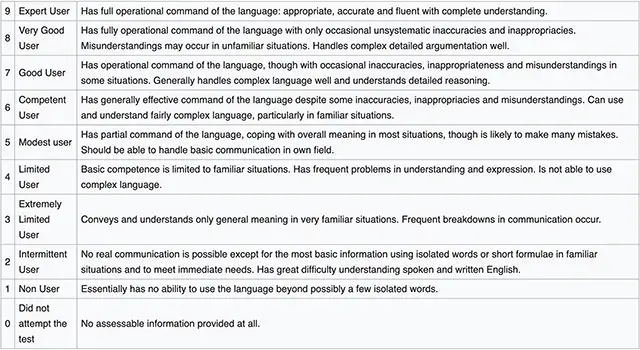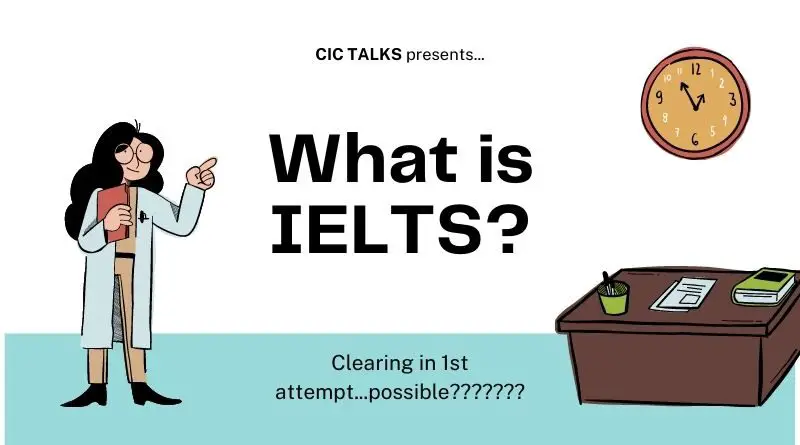What is the IELTS exam? How to clear IELTS on the first attempt?
Are you unsure of IELTS and seeking for strategies to pass on your first try? Look no farther; everything is covered in this article.
What is IELTS ?
The International English Language Testing System is abbreviated as IELTS. It began in the year 1980 and is currently one of the internationally recognised English language competence tests used for immigration, job visas, and higher education. Additionally, IELTS is highly preferred by nations including the US, UK, Canada, Australia, and New Zealand to evaluate language competency.
The IELTS test is jointly managed by IDP Australia, British Council and Cambridge Assessment.
Importance of IELTS exam
- It is tried and tested approach to assess english language proficiency for non-native english speakers.
- It is widely accepted by 10,000+ organisations including educational institutes, corporations, government agencies and professional regulation bodies.
- A candidate can grow his vocabulary and improve his communication skills while subsequently preparing for examination.
Types of IELTS examinations
International English Language Testing System (IELTS) is broadly classified into two categories – Academic and General Training (GT).
IELTS Academic as the name suggests, intends to serve the purpose of having higher education at global destinations. On the other hand, IELTS General Training is a more standardised format used to access employment and citizenship or permanent residence opportunities abroad.
Both of these exams gauge a candidate’s chances of success and capacity to adjust to foreign cultures by testing his language proficiency on comparable criteria but using a slightly different test format. In conclusion, always ensure that you study for and apply for the right test type based on your needs.
IELTS test format:
The pattern of the examination has four components:
- Listening
- Reading
- Writing
- Speaking
Listening and Speaking tests are of similar nature for both Academic and General Training candidates but Writing and Reading are partly different. I have explained them well in my other articles.
Also, the total duration of the test is 2 hours and 45 minutes.
Scoring System
Each test component – Listening, Reading, Writing and Speaking is assessed on a band scale (0-9) with Zero (0) being the lowest and Nine (9) being the highest band score. The average scores obtained in all four individual test components hence become the Overall band score.
Remember, there is no pass or fail in IELTS exam and there is no negative marking. So you can take your chances confidently.
Use our IELTS Listening & Reading band score calculators to know more.

IELTS Results/TRF
The test takers can check results within 3-5 days for IELTS computer-delivered exam. Whereas, the Test Report Form (TRF) is released after 13 days in the case of an IELTS paper-based exam.
The TRF is issued to all registered candidates irrespective of the band scores achieved.
It consists of Test Location, Nationality, Candidate’s photograph, Date of birth, first language, Band scores and IELTS test type (Academic or General Training).
Important tips to clear the IELTS test on the first attempt

Listening Tips
- At the beginning of the test, you should carefully read the directions and questions. Try to understand the context, such as who is speaking. They are where? What language do they use?
- Remember, you hear the audio only once. Therefore, you need to read, write and listen all at the same time.
- The question always follow the order of the recording. Don’t panic even if you miss one question, look ahead and follow the rest.
- In the real examination, you have time at the beginning of each section to look at the questions. Use this time well and develop a general idea.
- Sometimes speaker will give you an answer and then correct himself, watch out for this.
- Your writing should be legible when you transfer your answers to the answer sheet.
- It is highly useful to underline keywords in the question to help you focus on the words (or similar words) to listen for.
- Listen for ‘signpost words’ such as however, although and finally; they help you to anticipate what speaker will say.
- Avoid small errors such as spellings, omitting ‘s’, required initials like $ sign or incomplete representation of time for instance writing 2.15 instead of 2.15 PM.
- Write your answers immediately on the question sheet itself. Do not try to memorise it.
- Do not leave any blanks as you will not be penalised for any incorrect answer.
- Try to write your answers in CAPITALS, especially when you are unsure about particular punctuation.
The Listening test is the same for both Academic and General Training versions of IELTS and consists of four recorded monologues and conversations. You will need to answer 40 questions in response to four recordings which are a mix of monologues and conversations from a range of native speakers. You will only hear each recording once. There are 10 questions for each part of the Listening test.
Free resources to prepare for IELTS Listening:
Reading Tips
- Read the instructions for each task carefully, especially instructions regarding maximum number of words, and make sure you follow them.
- Skim through each text to try to get a basic understanding of what the text is all about.
- Each paragraph is focused on single theme. Find the central idea and answer the questions.
- Remember, questions appear in the same order as answers in the test.
- Do not get struck on a single question. Move on to the next question and revisit later.
- Unlike listening test, there is no extra time to transfer answers on the answer sheet.
- Copy the answers word-to-word as shown in the passage into your answer sheet.
- Practice reading with a clock to improve your speed.
The Reading test consists of 40 questions, designed to test a wide range of reading skills. These include reading for gist, reading for main ideas, reading for detail, skimming, understanding logical arguments and recognising writers’ opinions, attitudes and purpose. You will get similar question types in both the IELTS General Training and Academic tests, however, the reading text topics are different.
Free resources to prepare for IELTS Reading:
Writing Tips
- Make sure that your writing must be relevant to the question.
- Plan and organise your thoughts in paragraphs before start writing on the answer sheet.
- Use multiple linking words to connect and sequence your thoughts.
- Avoid use of slangs or any informal language.
- In Academic writing, write the accurate description of the chart/table/graph/diagram.
- In General Training writing, ensure the letter is addressed correctly.
- Your ideas/arguments should be clear and well structured. Read our IELTS band 9 Essay structure guide to know more.
- Don’t memorise model answers, they won’t fit into the question and you will make careless mistakes.
- Recheck your writing to correct your mistakes if any.
- Use a dark HB pencil to write responses and avoid the use of pen.
- Practice writing with a clock to improve your speed.
The Writing test lasts for 60 minutes, and you will need to complete two writing tasks, each of which requires different text types (description, report, discussion, argument, opinion text). The Writing Task 1 of the IELTS Academic test requires you to write a summary of at least 150 words in response to a particular graph (bar, line or pie graph), table, chart, or process. Whereas, the Writing Task 1 of the IELTS General test requires candidates to respond to a given problem with a letter requesting information or explaining a situation in 150 words.
Writing Task 2 calls for a minimum of 250 words. You will be given a topic to respond to, and your ability to do so will be evaluated. You will need to express and defend your opinion, discuss the subject, summarise relevant information, outline issues, and suggest potential solutions, all while backing up your writing with justifications, arguments, and examples from your knowledge or experience.
Free resources to prepare for IELTS Writing:
- Academic Writing Task-1 (Line Graph) ↗
- Academic Writing Task-1 (Bar chart) ↗
- General Writing Task-1 (Letter) ↗
- IELTS Writing Task-2 (Essay) ↗
- IELTS Writing Vocabulary ↗
Speaking Tips
- Greet the examiner politely and ask her permission to sit.
- Smile and relax – the more you keep your calm, the better your scores will be.
- Stay polite while answering questions.
- Always speak clearly so that examiner can hear you well.
- Don’t speak too fast as it can be difficult for the examiner to follow. Don’t speak too slow as you won’t have time to say much.
- Use fillers such as well, so, let me think.. etc. and don’t leave a long pause in-between.
- Use paraphrasing and idiomatic language to make your conversation intriguing.
- Remember, it’s not a test of knowledge so you are free to answer in your own words.
- Use ‘Yes’ and not ‘Yeah’ to affirm your stance.
- Be an active listener, Don’t misjudge the question.
- Make minimal use of your native language few days before the speaking test, try to converse only in english.
The Speaking test is a face-to-face, informal discussion with an IELTS examiner, and is the same for both Academic and General Training. The test is divided into 3 parts and takes between 11 and 14 minutes to test your pronunciation, fluency, and grammar.
Free resources to prepare for IELTS Speaking:
- IELTS Speaking Part-1 ↗
- IELTS Speaking Part-2 ↗
- IELTS Speaking Part-3 ↗
- Speaking Band Score Calculation ↗
- Speaking Band 9 Vocabulary ↗
- Speaking Tips & Strategies ↗
Conclusion
I hope you find this informative post on IELTS useful. If you have any doubts, please write them down in the comment section below or mail us at help@cictalks.com.
Wish you best of luck in your exam.
Regards,
Rajit!

